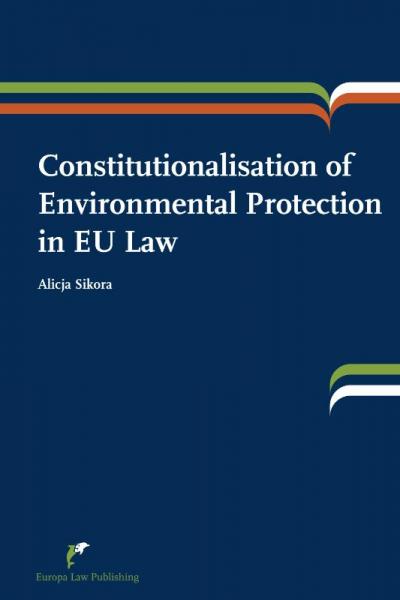This book describes the unique process of legal evolution in the field of environmental law, which is denoted as constitutionalisation of the environmental protection in the EU legal order. This notion refers to the process of transformation of this particular area of law, which is reflected in its novel autonomous features and materialised through the normative and jurisprudential elevation of environmental objectives and principles. In the course of recent years, environmental protection has evolved from a sectoral policy to one of the core, transversal principles of the EU legal order. Grasped through the prism of the principles of integration and coherence, the environmental protection has become all-present and influential aspect of EU legislation, while at the same time reaching the status of a fundamental value underlying the constitutional dimension of the European Union as a community of law. The book examines this process on the basis of comparative legal analysis, the current practice of EU institutions, and the recent case-law of the Court of Justice of the EU.
Reviewed by Daniel Sarmiento on EU Law Live
"But the main virtue of this book appears in the title itself. Environmental policy in the EU has gone through a process of constitutionalisation, something that was unimaginable two or three decades ago. The basis of Sikora’s theoretical proposals stand firm and she succeeds in giving meaning to a complex, convoluted and not always coherent set of rules, to the point that constitutionalisation seems, at times, like the only way forward for the European environmental policy."
Daniel Sarmiento is a Professor of EU Law (Complutense University of Madrid) and Editor-in-Chief of EU Law Live
"In a very comprehensive but at the same time well documented and intellectually thorough way, with a wealth of well-chosen references to ECJ and national case law, opinions of advocates general, EU legislative and international law developments as well as to academic work of different origins, she critically analyses a process of constitutionalization of environmental protection in the EU, where individual measures and principles have inspired the emergence of measures and principles of a constitutional nature."
Ben Smulders, book review, Common Market Law Review 57: 1647–1674, 2020
Dr. Alicja Sikora is an EU law academic, lecturer and practitioner with more than 15 years of experience in EU litigation, as a Legal Secretary at the Court of Justice of the European Union and as a Legal Advisor to the Council of the European Union. Graduate of Jagiellonian University and Université de Reims, Ph.D. in Law (Jagiellonian University, Cracow), Member of the Polish Bar (Cracow), Alicja Sikora currently acts as a Legal Advisor to the Council of the EU, and is a lecturer at the Faculty of Law of the Jagiellonian University. Her research interests focus on structural and constitutional aspects of EU law, as well as EU environmental law. She has published on variety of topics, including a monograph on the financial penalties under Article 260(2) and (3) TFEU (Kluwer Poland 2011).
Foreword vii
Contents xi
Preface
The purpose of this book
The structure of this book
Chapter I Environmental Protection in the EU Constitutional Perspective
1 Introductory remarks and conceptual framework
2 Hierarchy of EU constitutional norms
3 The constitutionalisation of environmental protection: history and legitimacy
4 A broader theoretical perspective: the values of democracy and the rule of law in the context of environmental protection
5 Conclusion
Chapter II A High Level of Environmental Protection in EU Law
1 The concept of ‘a high level of environmental protection and improvement of the quality of the environment’ in the normative structure of the Treaties
2 Article 37 of the Charter of Fundamental Rights – in search of the environmental identity of the Union
3 Article 37 of the Charter of Fundamental Rights as a cluster of three legal concepts
Chapter III Solidarity as a Prism for Constitutionalisation of Environmental Protection in EU Law
1 The EU principle of solidarity as a constitutional principle
2 The concept of intergenerational equity (solidarity) in environmental law
3 Mapping the contours of the relationship between solidarity and the environment in EU law
Chapter IV Judicial Coherence in Enhancing Environmental Protection
1 The role of EU judicature in ensuring environmental protection
2 The Court of Justice as environmental protector: alternative ways of enhancing environmental protection through judicial practice
3 Access to environmental justice in the EU legal order
Bibliography
Table of Cases
Table of Legislation
Index

